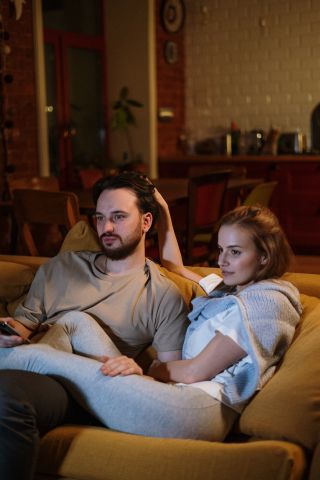Relationships
Play and Repeat: Why We Watch the Same Shows Over and Over
The benefits of bingeing on a particular story.
Posted December 22, 2022 Reviewed by Vanessa Lancaster
Key points
- Rewatching a movie, series or single episode enhances our well-being.
- Repeated viewing fulfills emotional needs, gives us comfort, provides a sense of control over our lives, and connects us with our past.
- Familiar shows provide an appealing mix of relaxation and stimulation, and an unexpected combination of old and new.
Watching a new movie or starting a new series can be entertaining and exciting. We get placed in a different world with a new set of characters, stories, and ideas. We see novel locations, learn unfamiliar perspectives, and vicariously experience the lives of other people.
Yet, many of us also enjoy watching the same familiar shows and individual episodes over and over again. Why do we spend so much time with stories we already know?
Fulfilling Our Emotional Needs

When rewatching familiar shows, we receive the stories and emotions we expect. We know how the episodes end and–more importantly–how we’ll feel when they end. Which is one reason we’re more likely to choose comedies for repeated viewing instead of dramas or tragedies.
Many of us watch our favorite holiday movies this time of year because we want the story–and the emotional payoff we know is coming.
Something Old, Something New
I’ve spent many hours rewatching the thirty-year-old movie Groundhog Day and even more countless hours watching particular scenes. In fact, the movie illustrates one benefit of repeated viewing.
The weather forecaster, played by Bill Murray, relives one day in his life with small, meaningful changes each day, which is the same experience we have when repeatedly watching the same show. We get obvious constancy, with a little something new–due to the selectivity of attention and the limitations of memory. Once we are familiar with the overall plot and the key scenes, we can detect and appreciate the details and subtleties of personal interactions we overlooked earlier.
In this way, repeated viewing fulfills two of our entertainment desires: familiarity and something new.
The Mere Exposure Effect
We like something more simply because we’ve been exposed to it–an outcome known as the mere exposure effect. We repeatedly listen to songs we like and enjoy them even more with each repetition. Art and architecture show the same effects. French Impression was strongly disapproved of at first, then beloved. The Eiffel Tower was heavily criticized when first constructed, but it was revered after it stood the test of time.
With repeated viewings of the same show, we like the show more and feel more attached to each repetition. With shows we enjoy, repetition is the mother of affection.
The Mister Rogers Effect
At the beginning of every show, Mister Rogers went through the same routine of changing into his cardigan sweater and around-the-house sneakers while singing the same reassuring words. He did this to provide the necessary stability and comfort to his young viewers. According to research by Cristel Antonia Russell and Sidney Levy1, repetition works for adults as well. Knowing what will happen bestows order and safety, especially during times when our lives feel uncomfortably less controlled.
The Principle of Least Effort
If we’re familiar with a story, we can let our minds relax while still being entertained. This is not laziness but rather a basic evolutionary fact that organisms (including humans) conserve energy by choosing a course of action that requires the smallest amount of effort. This principle is visibly documented on university campuses by the paths worn in the grass between classroom buildings. Watching a familiar show takes less cognitive effort than an unfamiliar show, and sometimes that’s exactly what we want.
Therapeutic Nostalgia

We rewatch old movies because they allow us to relive a time we remember with fondness. We have the same experience when listening to radio stations that play songs from a particular decade.
Movies place us into another world, not just in the enacted story but outside, in the story of our own lives. We get involved in the movie while remembering our lives associated with that movie.
While rewatching an old movie, we may connect with a person from our past, remembering the conversations we had afterward, the jokes we told, and the references we made.
If we do satiate, we can leave the repeated viewings and return much later for a new dose of therapeutic nostalgia.
The Paradox of Choice
The psychologist Barry Schwartz found that the more options we’re offered, the less satisfied we are with our choices–the paradox of choice. An overwhelming array of options creates anxiety and dissatisfaction, ultimately leading to avoiding choosing.

Online streaming services offer large selections of content. If we’re dedicated to finding something appealing, deciding what to watch can be complicated, tedious, and just not worth the time. There’s simply too much to choose from, so we stay clear of the new choices and go with something we already know. Like comfort food, a familiar favorite is always easy to digest and satisfying.
The Conjuring Effect
When we listen to the same music over and over, we experience what the author Elizabeth Margulis calls “a conjuring power.” Knowing exactly what will happen gives us a sense of personally controlling the outcomes. The same goes for rewatching movies and series. Repeated viewings may make us feel that the characters are taking our commands. And this feeling of directing the people and their actions can bring about abundant satisfaction.
More generally, in choosing to rewatch, we take control over the stories we experience, the people we see, the feelings we want, and the endings we desire.
Parasocial Relationships
While becoming increasingly familiar with the characters in a series, we may develop satisfying parasocial relationships with these characters–one-sided connections that the other person doesn’t know about but satisfy some of our social needs.
When we rewatch a series or a show, we return to these parasocial relationships, placing ourselves in the presence of especially reliable friends who do what we expect them to. Such relationships can increase a sense of belongingness and reduce loneliness.
In addition, we may also connect with communities of people who watch the same show. A good friend of mine bonded with two of my granddaughters through their common love of The Office.
Awareness of Our Growth
Rewatching a familiar movie allows us to revisit an old memory with a new perspective. We understand more–or differently–because of intervening experiences. Nearly twenty years ago, the popular wine movie Sideways introduced me to the world of wine obsession and connoisseurship. And now, when I watch it–after nearly two decades of wine collecting–I understand more about the details of wine and changes in myself while still enjoying the story.
Satisfying Endings
Creating a fulfilling ending is difficult. New movies may thrill us for a while, but they can also disappoint us with their endings. Add to that, an ending casts its image over the entire story, shaping our attitude about the whole movie.
With familiar shows, endings never disappoint.
Final Words
Why do we spend so much time with stories we already know? The most obvious explanation for rewatching a movie, a series, or an episode is that we enjoy it. And the same reasons we enjoyed a show the first time are still there when we watch it again.

Many of us listen to the same songs over and over without questioning ourselves or the reasons for doing so. The same self-acceptance should go for rewatching movies, television series, and individual shows. Rewatching can be healthy, fun, and therapeutic.
In fact, the unfolding scenes can seem like music, with familiar melodies, engaging rhythms, and appealing harmonies, capable of giving us the cognitive and emotional responses we want and expect. I’ve repeatedly watched the last episode of the Netflix series The Chair because, for me, the timing, dialog, and actions are music. And I know that the sweet and salty ending will uplift me every time.
Researchers Russell and Levy concluded that “reconsuming can be an extraordinary experience, filled with the emotional luxury of delight, novel sensations, and intellectual insight.”2
References
1. Russell, C.A. & Levy, S.J. (2012). Journal of Consumer Research, Volume 39 (2), pp. 341–359. https://doi.org/10.1086/662996
2. The pdf can be found at https://www.gwern.net/docs/culture/2012-russell.pdf
Schwartz, B. (2005). The Paradox of Choice: Why More Is Less. https://www.goodreads.com/book/show/10639.The_Paradox_of_Choice
Margulis, E. (2013). On Repeat: How Music Plays the Mind. https://global.oup.com/academic/product/on-repeat-9780199990825?cc=us&l…;




